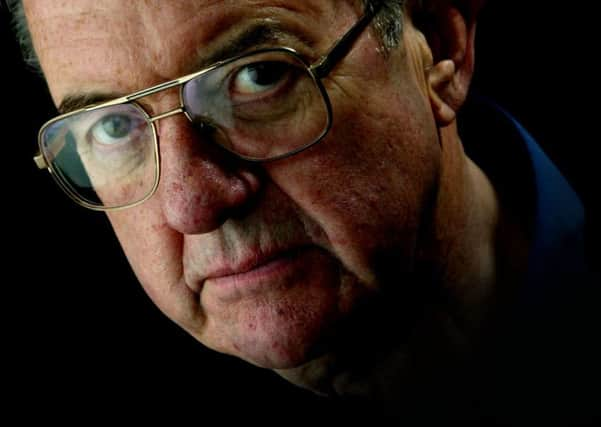Obituary: Gordon Williams, writer whose novel became the controversial film Straw Dogs


Few authors had as varied a career as Gordon Williams, who served as ghostwriter for Bobby Moore and Denis Law, created the television detective Hazell with another football legend, Terry Venables, and wrote the novel on which the notorious 1971 film Straw Dogs was based.
Williams is also one of the few Scots to be shortlisted for the Booker Prize. He was nominated in the inaugural year, 1969, alongside Irish Murdoch and Muriel Spark, for his novel From Scenes Like These, a bleak picture of Scottish life in the 1950s, with alcohol taking the place of thwarted dreams.
Advertisement
Hide AdAdvertisement
Hide Ad“My editor, who was a judge, told me I’d won,” he said in an interview in The Scotsman five years ago. “In fact my wife and I had already spent the 5,000 quid on a new bathroom. When my name wasn’t read out I was bloody pissed off.” The surprise winner was PH Newby for Something to Answer For.
Like Graham Greene, Williams alternated serious literary fiction, which in Williams case drew on his humble beginnings in Paisley, with lighter “entertainments”.
Sometimes he would provide his publisher with a title and opening, collect a £150 cheque, and then, if the publisher liked it, would return with a finished manuscript a few days later and pick up a second £150 cheque.
Williams maintained that The Siege of Trencher’s Farm, the novel on which Straw Dogs was based, started off as just another potboiler about an American academic who relocates to Cornwall to write a book, accidentally ends up sheltering an escaped child-killer and finds himself besieged by local vigilantes as law and order breaks down.
It was published in 1969 by the highly respectable house of Secker and Warburg, attracted the attention of Hollywood and was transformed into Straw Dogs by director Sam Peckinpah and writer David Zelag Goodman, with Dustin Hoffman as the US academic and Susan George his English wife.
They continued tweaking the story right up to and during filming, including adding a rape scene which provoked huge controversy. The film came out in 1971, following cuts by the censors. It was part of a new wave of movies that pushed back the boundaries on sex and violence.
Unlike many other films of the time, though, Straw Dogs has remained controversial for the rape scene in which the behaviour of the wife appears to provoke the attack. Williams dismissed the film as “neo-Nazi crap”.
While Straw Dogs as a title will resonate more readily with the wider public, Williams remains highly respected in literary circles for novels such as From Scenes Like These and Walk Don’t Walk, his 1972 novel about a Scottish writer whose sudden success sees him touring America.
Advertisement
Hide AdAdvertisement
Hide AdThe son of a police constable, Gordon Maclean Williams was born in Paisley’s Ferguslie Park area in 1934. In the foreword to Walk Don’t Walk he compared his early experiences with dreams and images of America, but noted that his upbringing was not as deprived as that of many of his neighbours.
“Nobody was rich in the jungle of Ferguslie Park Avenue,” he wrote, “but in our house we had shoes and a complete set of the Waverley Novels of Sir Walter Scott and food parcels from our Auntie in Texas, bubble gum and spam and white sugar cubes, Superman comics.”
He attended the John Neilson Institution school, left at 15 and became a junior reporter on the Johnstone Advertiser at £2 a week, plus commission for any adverts he could get. He even had to deliver papers to newsagents on press day.
After national service in the RAF he returned briefly to the Johnstone Advertiser, before taking a better-paid job with the Poole and Dorset Herald, which in turn led to various jobs in London, while he spent several years honing a debut novel about life in the RAF.
He did eventually bring out a novel about the RAF, The Camp (1966), but little, if any, of his original manuscript remained in the new work. In the meantime he wrote a biography of Acker Bilk and worked as a ghostwriter for various footballers.
His novel The Last Day of Lincoln Charles appeared in 1965, inspired by a real-life shooting in Margate. It was followed by The Camp, The Man Who Had Power Over Women (1967), which was turned into a film with Rod Taylor a few years later, and From Scenes Like These, which raised his profile significantly.
Through his ghostwriting he got to know some top footballers and he and Terry Venables co-wrote a novel called They Used to Play on Grass (1972), which was followed by several novels featuring the cockney private detective James Hazell. They were written under the single pseudonym PB Yuill as they felt Venables’s involvement had effected the critical perspective of their earlier work.
Hazell was turned into a popular TV series with Nicholas Ball in the title role. It ran for two series in 1978-79, by which time Venables’ career as a manager was taking off.
Advertisement
Hide AdAdvertisement
Hide AdIn the late 1970s and early 1980s Williams wrote several science-fiction novels. He rejected Bill Forsyth’s approaches to work with him on the script of Gregory’s Girl (1981). He did adapt the Ruth Rendell novel The Tree of Hands for a 1989 film version with Lauren Bacall.
But Williams became “bored” with writing, he was never part of “the literary set” and latterly he lived quietly in London with his wife Claerwen, a novelist who became a psychotherapist.
Williams is survived by his wife, children Harriet, Jessica and Sam, and three grandchildren.
BRIAN PENDREIGH